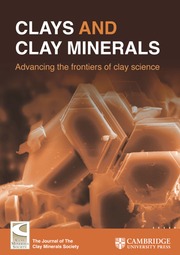Crossref Citations
This article has been cited by the following publications. This list is generated based on data provided by
Crossref.
Ebener, Michael
Fircks, Gero Von
and
Günther, Harald
1991.
High‐Resolution Solid‐State MAS13C‐ and 1H‐NMR Spectra of Benzenoid Aromatics Adsorbed on Alumina and Silica: Successful Applications of 1D and 2D Pulse Experiments from Liquid‐State NMR.
Helvetica Chimica Acta,
Vol. 74,
Issue. 6,
p.
1296.
Tipton, T.
and
Gerdom, L. E.
1992.
Polymerization and Transalkylation Reactions of Toluene on Cu(II)-Montmorillonite.
Clays and Clay Minerals,
Vol. 40,
Issue. 4,
p.
429.
Goodman, B. A.
and
Chudek, J. A.
1994.
Clay Mineralogy: Spectroscopic and Chemical Determinative Methods.
p.
120.
Kowalska, Maria
Güler, Hülya
and
Cocke, David L.
1994.
Interactions of clay minerals with organic pollutants.
Science of The Total Environment,
Vol. 141,
Issue. 1-3,
p.
223.
Katikaneni, Sai P. R.
Adjaye, John D.
and
Bakhshi, Narendra N.
1995.
Catalytic conversion of canola oil to fuels and chemicals over various cracking catalysts.
The Canadian Journal of Chemical Engineering,
Vol. 73,
Issue. 4,
p.
484.
Krajčovič, Jozef
Hudec, Pavel
and
Grejták, František
1995.
Catalytic properties of pillared montmorillonites.
Reaction Kinetics & Catalysis Letters,
Vol. 54,
Issue. 1,
p.
87.
Ioppolo-Armanios, Marisa
Alexander, Robert
and
Kagi, Robert I.
1995.
Geosynthesis of organic compounds: I. Alkylphenols.
Geochimica et Cosmochimica Acta,
Vol. 59,
Issue. 14,
p.
3017.
Alexander, Robert
Bastow, Trevor P.
Fisher, Steven J.
and
Kagi, Robert I.
1995.
Geosynthesis of organic compounds: II. Methylation of phenanthrene and alkylphenanthrenes.
Geochimica et Cosmochimica Acta,
Vol. 59,
Issue. 20,
p.
4259.
Ukrainczyk, Ljerka
and
Smith, Karen Ann
1996.
Solid State 15N NMR Study of Pyridine Adsorption on Clay Minerals.
Environmental Science & Technology,
Vol. 30,
Issue. 11,
p.
3167.
Buchanan, A. C.
Britt, Phillip F.
and
Struss, John A.
1997.
Investigation of Reaction Pathways Involved in Lignin Maturation.
Energy & Fuels,
Vol. 11,
Issue. 1,
p.
247.
Naicker, Kannan P.
Lalitha, A.
Pitchumani, K.
and
Srinivasan, C.
1998.
Clay-catalysed dealkylation of organic sulfides.
Catalysis Letters,
Vol. 56,
Issue. 4,
p.
237.
Birkel, Ulf
and
Niemeyer, Jürgen
1998.
Tonminerale als Katalysatoren bei der Umwandlung von organischen Verbindungen.
Umweltwissenschaften und Schadstoff-Forschung,
Vol. 10,
Issue. 6,
p.
345.
Tsiao, C.-J
Carrado, K.A
and
Botto, R.E
1998.
Investigation of the microporous structure of clays and pillared clays by 129Xe NMR.
Microporous and Mesoporous Materials,
Vol. 21,
Issue. 1-3,
p.
45.
Jayasundera, Shalini
Schmidt, Walter F.
Hapeman, Cathleen J.
and
Torrents, Alba
1999.
Influence of the Chemical Environment on Metolachlor Conformations.
Journal of Agricultural and Food Chemistry,
Vol. 47,
Issue. 10,
p.
4435.
Ruggiero, P.
1999.
Bioavailability of Organic Xenobiotics in the Environment.
p.
159.
Carrado, K. A.
Xu, L.
Gregory, D. M.
Song, K.
Seifert, S.
and
Botto, R. E.
2000.
Crystallization of a Layered Silicate Clay as Monitored by Small-Angle X-ray Scattering and NMR.
Chemistry of Materials,
Vol. 12,
Issue. 10,
p.
3052.
Sun Kou, M. R.
Mendioroz, S.
and
Muñoz, V.
2000.
Evaluation of the Acidity of Pillared Montmorillonites by Pyridine Adsorption.
Clays and Clay Minerals,
Vol. 48,
Issue. 5,
p.
528.
Song, Kang
and
Sandí, Giselle
2001.
Characterization of Montmorillonite Surfaces After Modification by Organosilane.
Clays and Clay Minerals,
Vol. 49,
Issue. 2,
p.
119.
Seçki̇n, Turgay
Gültek, Ahmet
i̇çduygu, M. Galip
and
önal, Yunus
2002.
Polymerization and characterization of acrylonitrile with γ‐methacryloxypropyltrimethoxy‐silane grafted bentonite clay.
Journal of Applied Polymer Science,
Vol. 84,
Issue. 1,
p.
164.
Ruggiero, P.
Pizzigallo, M.D.R.
and
Crecchio, C.
2002.
Soil Mineral-Organic Matter-Microorganism Interactions and Ecosystem Health.
Vol. 28,
Issue. ,
p.
95.

